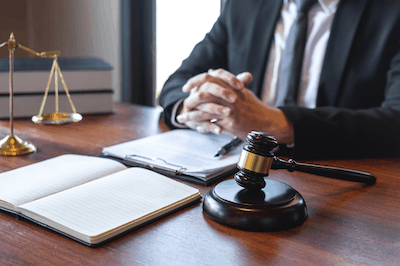
16 Jun Are Depositions Confidential? What You Should Know
Are Legal Depositions Confidential?
Leading up to a trial, there is a process of “discovery” that occurs on both sides of the case, where evidence and pieces of information are gathered so that strong arguments can be built up.
An important part of this process is the sworn testimonies that are given by both parties. Vital pieces of evidence are uncovered during these kinds of depositions which means that sensitive and valuable information is being shared.
If you are in this position, it is only natural for you to be concerned about this information being made public knowledge. That’s why we are asking the question—are depositions confidential?
A deposition transcript is not usually filed as part of the public record. In addition, a protective order can be issued by a court for any exhibits or transcripts to stay confidential. This means that the information isn’t allowed to be passed on to any third parties, or distributed to anyone who doesn’t have direct involvement in the case.
While this is generally how most cases play out, there are still some reasons why a deposition transcript might be made public record. Read on to find out why.
Are Depositions Ever Made Public Record?
Your deposition will generally play a big part in the courtroom to provide solid facts when there are so many uncertain allegations. It is also able to contradict the testimony of a witness or impeach them in some scenarios.
After the case has been settled, depositions don’t normally get turned over to the public because they are not included with the court’s routine filings. Copies will only be sent to the associated parties that have requested them, as well as to the attornies who worked on the case.
However, there are some occasions when a deposition transcript needs to be attached in the form of an exhibit to other related documents, and this entire package is then filed with the court.
If that happens to you with your case and it is filed by the court, it then becomes public record. Remember that this doesn’t happen as often, so you shouldn’t be too concerned about it happening with your case.
What If I Don’t Want To Participate In A Non-Confidential Deposition? 
Lawsuits can get messy, and tensions can rise, becoming overwhelming during the process. If you find yourself in this state, it’s easy to understand if a deposition is something that you would rather avoid at this time.
However, in a trial that requires that both sides present evidence to support their respective cases, it is quite necessary to go through. If there has been a subpoena, which compels someone to provide testimony for a case, and you still choose to refuse it, there is the possibility that there will be a punishment for contempt of court.
If someone declines a deposition when contacted with a subpoena without any justification, there will also be fees issued to cover the fees of attorney’s.
The court also has the power to render judgment based on your decision to not participate, or not allow you to bring up particulars with certain pieces of evidence.
In the long run, as difficult as it may be, the best decision is to adhere to the requirements and summons from the court for the best possible outcome for your case.
Preparing To Testify In A Deposition That May Not Be Confidential
Don’t worry, despite the hesitation you might be feeling at this point, there are ways to navigate a deposition with poise, even if there are things that need to be said that you wouldn’t like to become public record. As long as you know what to look for and what to work on, you can be ready to take this step of the process head-on and without fear.
Here are a few tips as you prepare to testify in a deposition:
1. Take Preparation Seriously
This sounds like an easy one to start with, but it can easily be overlooked in a busy trial. You may think that your lawyer is the only one who needs to prepare, but this could not be further from the truth.
Preparation can look like you walking through the details of the case that might require more elaboration or development as you give your testimony. This will help you have your thoughts clear and in order.
You can also talk to your attorney about the case strategy so that you know the important key points to hone in on. How prepared you are will determine how you answer, and how you answer will end up directing the course of the questioning.
2. Set Aside Some Time To Study
Lawyers won’t also expect you to do this, but it never hurts knowing the rules of your deposition. Studying before a deposition means learning about time limits for questioning the witnesses and how many objections are allowed during questioning.
Ultimately, this will help you feel more in the loop, as well as make you feel more at ease. Your attorney will certainly be able to help you with this portion and answer any questions that you have leading up to the depositions.
3. Don’t Let Yourself Get Pushed Around
Sitting in a room with attornies can be intimidating, and nobody is denying that. But since you have been taking time to prepare, remember that you simply need to be yourself and tell the truth.
Some attornies will try scare tactics or try to question you into a corner, but don’t let them get the better of you. Stay calm, stay collected, and never lash out emotionally. If these things aren’t in control, you might accidentally let personal information slip out that could be damaging to your case.
The more you feel prepared, the less worried you have to be about being bullied.
4. Approach Your Deposition With Confidence
A lot of people come into depositions with a lot of nervousness, anxiety, or even fear. However, it is crucial to remember that it is not about succeeding or failing at this point, it’s about communicating and letting facts be put on the table.
Don’t let your mind get the better of you and turn it into something that it’s not. Walk into the room with confidence and be assured that you will be able to answer questions clearly if you stay focused.
5. Create Bullet Points To Reference
Before a deposition, you might be tempted to write out long drafts of answers to some of the questions you think you will be asked, but this will only make things more stressful for you.
Instead, focus on some of the main questions that your attorney has recommended you to focus on and write out some bulleted points that are clear and to the point.
Doing this will help you sort out your thoughts, as well as help you feel more confident going into the deposition.
Once you have some of these bulleted answers written down, run them by your attorney to get feedback on how to rephrase or reword some parts of your statements. This will refine your answers and help the questioning to move along smoothly.
Conclusion
Trials are sensitive matters, and this means that sensitive information will always be transferred. Even if this is true, it doesn’t mean that you have to stay in the dark on how legal matters operate.
We hope you feel more at ease and in the know after reading this information, and are more confident in preparing for your deposition.
If you have any more questions about the details of the deposition process or any other legal proceedings, don’t hesitate to reach out to a local business attorney. They’ll have valuable information that can help you prepare to the best of your abilities for your unique situation.





